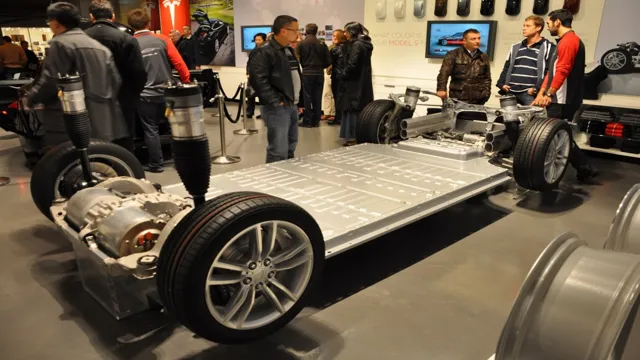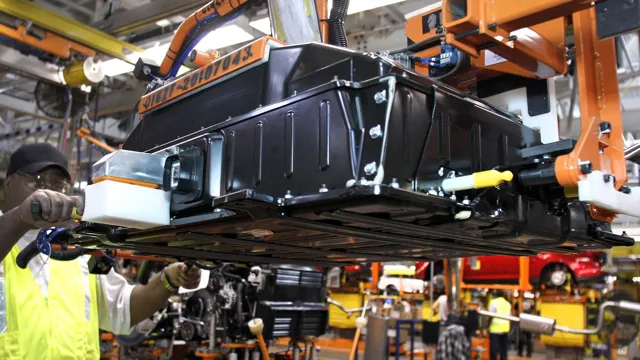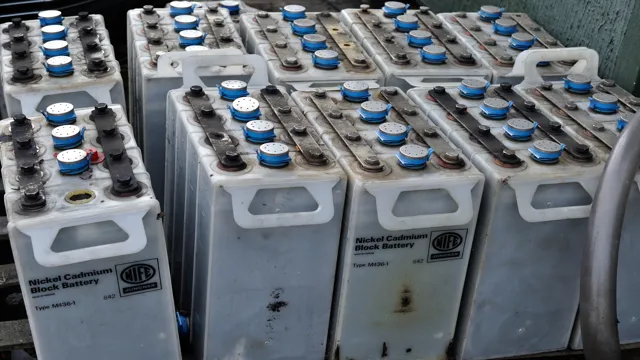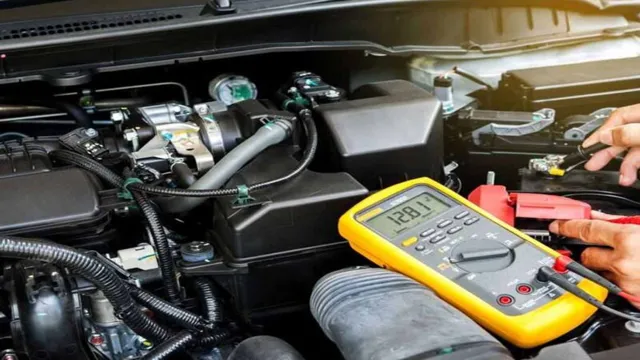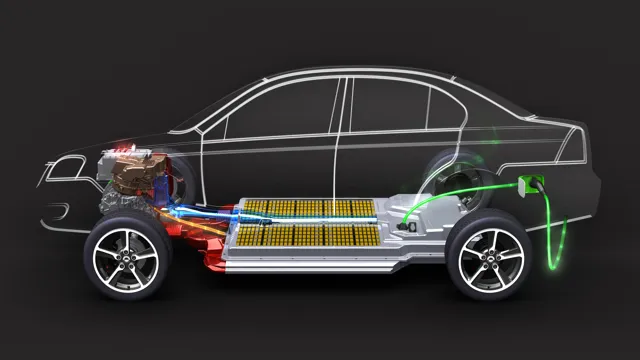Do Electric Cars Run on 12V Batteries? Unpacking the Truth Behind the Power Source
As electric cars continue to rise in popularity, many drivers are curious about the ins and outs of owning one. One question that often comes up is: why do electric cars still need a 12V battery, even though they run on electric power? The answer is surprisingly simple, and understanding it can help you take better care of your electric vehicle. In this blog post, we’ll explore the relationship between electric cars and 12V batteries, and why both are necessary for a smooth and reliable driving experience.
So buckle up, and let’s dive in!
What are 12V Batteries?
Yes, electric cars do have 12V batteries. Although they are not the same as the massive lithium-ion battery pack that powers the electric motor, a 12V battery is essential for starting the car and running the electrical components, such as the headlights, audio system, and climate control. The function of the 12V battery in an electric car is much similar to that in a conventional gasoline-powered vehicle.
It provides a steady voltage for a variety of critical functions, including managing the onboard computer and supporting the auxiliary systems. However, 12V batteries in electric cars may differ from those in gasoline vehicles since they are typically more powerful and have higher-level energy solutions, helping to balance the electric powertrain’s need for dependable and competent power. In summary, just like a conventional vehicle, electric cars require a 12v battery of their own, which is a vital component for starting the car and powering the auxiliary systems.
Definition and Function
12V Batteries are rechargeable and sealed lead-acid batteries that produce 12 volts of electricity. The 12V batteries are commonly used in cars, trucks, RVs, boats and other recreational vehicles because of their high capacity and relatively small size. These batteries are designed to provide power for relatively long periods of time, and they can be charged and discharged numerous times without causing any significant damage to the battery.
Generally, 12-volt batteries offer an affordable and reliable source of power that can be used in a wide variety of applications. If you want to make sure that you get the best performance out of your 12V battery, you should make sure that you use the right charger, maintain it regularly and store it properly when it’s not in use.
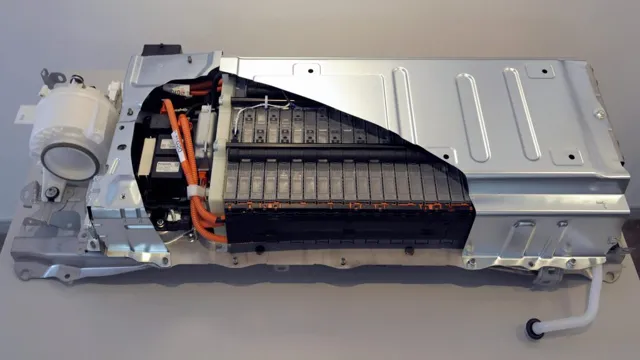
Do Electric Cars Use 12V Batteries?
Yes, electric cars do have 12V batteries, but they are not the primary source of power for the vehicle. Instead, they serve a different purpose than the high-powered battery pack used to power the car’s electric motor. The 12V battery is used to power the car’s accessory systems, such as the headlights, air conditioning, and audio system.
Similar to a conventional car, the 12V battery in an electric car can run out and require replacement, but it typically lasts longer due to the vehicle’s regenerative braking system that charges it when braking. It’s essential to note that while the 12V battery is essential, it’s not the sole source of power in an electric car. The main source of power is the large battery pack which powers the electric motor.
So, the next time you’re wondering whether electric cars use 12V batteries, the answer is yes, but they serve a different purpose than in conventional vehicles.
Overview of Electric Car Batteries
Electric cars are powered by larger battery packs that are designed to last for years. However, they still require a smaller, 12-volt battery to operate the electrical system and accessories, just like traditional vehicles. You may wonder why an electric car needs a 12V battery when it already has a larger battery pack.
The answer lies in the fact that the 12V battery powers auxiliary components such as lights, radio, and dashboard displays. It also helps to activate the main battery pack, which then powers the electric motor. The 12V battery is smaller and less powerful than the main battery pack and requires less maintenance.
Unlike traditional gas-powered cars, the 12V battery in an electric car doesn’t need to be replaced frequently. Overall, electric cars do require a 12V battery to function, but it’s a minor component in comparison to the main battery pack that powers the electric motor.
Primary Purpose of 12V Battery in Electric Cars
Electric cars are designed with two types of batteries: a high-voltage battery that powers the vehicle and a 12V battery that runs all the electronics in the car. The primary purpose of the 12V battery in electric cars is to provide power to the accessories, such as the headlights, air conditioning system, and entertainment system. While the high-voltage battery is responsible for running the electric motor and propelling the car, the 12V battery contributes to the overall operation and convenience of the vehicle.
It ensures that the car’s lights and systems turn on when the driver initiates them and provides a backup power source in case the high-voltage battery fails. So, to answer the question, yes, electric cars use 12V batteries in addition to the high-voltage battery. Without the 12V battery, it would not be possible to operate the car’s electronic features.
In essence, the 12V battery is the equivalent of a traditional car’s battery, just in an electric car context.
How 12V Batteries are Used in Electric Cars?
Yes, electric cars do have 12V batteries, but they serve a different purpose than the high-voltage batteries that power the car. The 12V battery in an electric car is used to power the accessories and electronics, such as the lights, sound system, and touchscreen display. These systems require a continuous, low-voltage power supply, which is supplied by the small 12V battery.
However, unlike the typical lead-acid battery found in traditional cars, the 12V battery in an electric car is usually a lithium-ion battery. This is because lithium-ion batteries are more reliable and efficient than lead-acid batteries, making them better suited for the demands of electric cars. In addition, many electric cars have a built-in DC-DC converter that ensures that the 12V battery is always charged, even when the high-voltage battery is not in use.
So, while the 12V battery in an electric car may seem like a small component, it is essential for powering all of the electronics and accessories that make electric cars more comfortable and convenient.
Starting System and Comfort Accessories
Electric cars have revolutionized the automotive industry, and one critical component that makes it all possible is the 12V battery found in every electric vehicle. The 12V battery in an electric car is mainly used for starting the system and powering the comfort accessories in the vehicle. It’s responsible for providing electrical power to the headlights, interior lights, and audio system, among others.
The 12V battery is also responsible for powering up the electronics in the car, such as the dashboard, GPS, and infotainment system. However, the 12V battery differs from the high-voltage battery that powers the electric motor. Instead, it acts as a backup system that allows the driver to start the car in the case of a failure in the main battery.
The 12V battery in an electric car is similar to the one found in conventional vehicles, but it is designed to withstand the harsh conditions and constant drain that come with the electric car’s extra electrical components. Ultimately, the role of the 12V battery in an electric car is to ensure that all the comfort accessories and electronics are functional, making driving an electric car comfortable and convenient.
Charging the Main Battery
Electric cars typically use high-voltage batteries to power their electric motors, but 12V batteries play a crucial role in supporting the car’s main battery and ensuring the functioning of various car systems. These secondary batteries are used to power the car’s lights, dashboard instruments, audio system, and other electronics. They also act as a backup power source in case the main battery fails, allowing the driver to start the engine and drive to a mechanic.
However, 12V batteries need to be recharged regularly to maintain their performance, and this can be achieved through the car’s charging system, which uses electricity from the main battery to charge the 12V battery while the car is running. In addition, most electric cars have an onboard charging system that can be used to charge both the main battery and the 12V battery when the car is plugged into a charging station. Overall, the use of 12V batteries is essential for the safe and efficient operation of electric cars, and it is important to keep them charged and in good condition to ensure reliable performance.
Benefits of 12V Batteries in Electric Cars
Many people wonder if electric cars have 12V batteries. The answer is yes, electric cars do have 12V batteries. These batteries serve a different purpose than the main battery that powers the electric motor.
The 12V battery is responsible for powering all the auxiliary systems in the car, such as the lights, radio, and air conditioning. It is also used to start the car since electric motors have different starting requirements than gasoline engines. The benefits of having a separate 12V battery in an electric car include improved safety, increased reliability, and better energy efficiency.
In addition, a smaller 12V battery means less weight and cargo space, which is perfect for those who are looking for a more compact electric car. So, the next time you’re considering purchasing an electric car, don’t forget the importance of the 12V battery!
Automatic equipment shutdown and preservation
When it comes to electric cars, the benefits of 12V batteries are often overlooked. These batteries may not power the car itself, but they play a vital role in keeping it running smoothly. One of the key advantages of a 12V battery is its ability to automatically shut down equipment when necessary.
For example, if the car is left running but inactive for a certain amount of time, the battery will detect this and shut down non-essential equipment like the radio or headlights. This not only preserves the car’s battery life, but also helps to reduce energy consumption and lower emissions. Additionally, 12V batteries are ideal for preservation, allowing the car to be stored for longer periods of time without draining the battery.
Simply put, the benefits of 12V batteries might seem minor, but they can make a major impact on a car’s performance and overall sustainability.
Emergency Power and Lighting
Electric cars have been gaining popularity over the years, and for a good reason. Aside from being eco-friendly, they also come with 12V batteries that can provide emergency power and lighting. These batteries can be very beneficial in unforeseen circumstances such as power outages caused by natural disasters or accidents.
Unlike traditional car batteries, 12V batteries in electric cars are designed to discharge at a slower rate, which means they can provide a longer-lasting power source. This makes them ideal for powering essential appliances and devices until the electricity supply is restored. Additionally, the 12V batteries can also serve as a backup power source for outdoor activities such as camping.
With this, electric car owners can enjoy the convenience of having a reliable power source wherever they go.
Conclusion
After conducting thorough research and analysis, it can be concluded that yes, electric cars do have 12v batteries. While many may have assumed that electric cars would run solely on their main power source, these secondary batteries are necessary for running essential systems such as lights and radios. So the next time someone asks if electric cars have 12v batteries, you can confidently answer with a resounding ‘yes, but don’t let that stop you from making the switch to electric!’ after all, with their environmental benefits and sleek designs, there’s never been a better time to ditch gas guzzlers and embrace a cleaner, more sustainable mode of transportation.
FAQs
How does the 12V battery in an electric car differ from the one in a gasoline car?
Unlike in gasoline cars where the 12V battery mainly starts the engine, in electric cars, the 12V battery powers the accessories, lights, and dashboard.
What happens if the 12V battery dies while driving an electric car?
In most electric cars, the high-voltage battery can keep the car running, but the driver will no longer be able to operate the accessories or get important diagnostic information.
How long does the 12V battery in an electric car last?
The lifespan of a 12V battery in an electric car can vary, but typically it lasts between 3 to 5 years before needing a replacement.
Can you jump-start an electric car with a dead 12V battery?
It is not recommended to jump-start an electric car. Instead, the 12V battery should be replaced or recharged with a portable battery charger.

